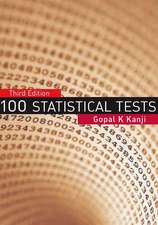Experimental Econophysics: Properties and Mechanisms of Laboratory Markets: New Economic Windows
Autor Ji-Ping Huangen Limba Engleză Hardback – 20 aug 2014
hedge behavior, cooperation, business cycles, partial information, risk management, and stock prediction. Experimental econophysics together with empirical econophysics are two branches of the field of econophysics. The latter one has been
extensively discussed in the existing books, while the former one has been seldom touched. In this book, the author will focus on the branch of experimental econophysics.
Empirical econophysics is based on the analysis of data in real markets by using some statistical tools borrowed from traditional statistical physics. Differently, inspired by the role of controlled experiments and system modelling (for computer simulations and/or analytical theory) in developing modern physics, experimental econophysics specially relies on controlled human experiments in the laboratory (producing data for analysis) together with agent-based modelling (for computer simulations and/or analytical theory), with an aim at revealing the general
cause-effect relationship between specific parameters and emergent properties of real economic/financial markets. This book covers the basic concepts, experimental methods, modelling approaches, and latest progress in the field of experimental
econophysics.
| Toate formatele și edițiile | Preț | Express |
|---|---|---|
| Paperback (1) | 383.12 lei 43-57 zile | |
| Springer Berlin, Heidelberg – 17 sep 2016 | 383.12 lei 43-57 zile | |
| Hardback (1) | 390.46 lei 43-57 zile | |
| Springer Berlin, Heidelberg – 20 aug 2014 | 390.46 lei 43-57 zile |
Din seria New Economic Windows
- 18%
 Preț: 953.97 lei
Preț: 953.97 lei - 15%
 Preț: 647.08 lei
Preț: 647.08 lei -
 Preț: 398.74 lei
Preț: 398.74 lei -
 Preț: 386.81 lei
Preț: 386.81 lei - 15%
 Preț: 635.15 lei
Preț: 635.15 lei - 18%
 Preț: 1395.63 lei
Preț: 1395.63 lei - 18%
 Preț: 791.09 lei
Preț: 791.09 lei - 18%
 Preț: 781.77 lei
Preț: 781.77 lei - 18%
 Preț: 951.29 lei
Preț: 951.29 lei -
 Preț: 379.09 lei
Preț: 379.09 lei - 15%
 Preț: 644.63 lei
Preț: 644.63 lei -
 Preț: 399.67 lei
Preț: 399.67 lei -
 Preț: 386.00 lei
Preț: 386.00 lei - 18%
 Preț: 941.82 lei
Preț: 941.82 lei -
 Preț: 389.70 lei
Preț: 389.70 lei - 18%
 Preț: 729.23 lei
Preț: 729.23 lei - 18%
 Preț: 951.91 lei
Preț: 951.91 lei - 18%
 Preț: 949.10 lei
Preț: 949.10 lei - 15%
 Preț: 643.00 lei
Preț: 643.00 lei - 15%
 Preț: 645.47 lei
Preț: 645.47 lei - 15%
 Preț: 585.40 lei
Preț: 585.40 lei - 15%
 Preț: 695.53 lei
Preț: 695.53 lei - 15%
 Preț: 636.63 lei
Preț: 636.63 lei - 18%
 Preț: 786.66 lei
Preț: 786.66 lei - 15%
 Preț: 634.18 lei
Preț: 634.18 lei - 18%
 Preț: 1112.15 lei
Preț: 1112.15 lei
Preț: 390.46 lei
Nou
Puncte Express: 586
Preț estimativ în valută:
74.72€ • 78.21$ • 62.19£
74.72€ • 78.21$ • 62.19£
Carte tipărită la comandă
Livrare economică 31 martie-14 aprilie
Preluare comenzi: 021 569.72.76
Specificații
ISBN-13: 9783662442333
ISBN-10: 3662442337
Pagini: 207
Ilustrații: XV, 192 p. 75 illus., 35 illus. in color.
Dimensiuni: 155 x 235 x 15 mm
Greutate: 0.47 kg
Ediția:2015
Editura: Springer Berlin, Heidelberg
Colecția Springer
Seria New Economic Windows
Locul publicării:Berlin, Heidelberg, Germany
ISBN-10: 3662442337
Pagini: 207
Ilustrații: XV, 192 p. 75 illus., 35 illus. in color.
Dimensiuni: 155 x 235 x 15 mm
Greutate: 0.47 kg
Ediția:2015
Editura: Springer Berlin, Heidelberg
Colecția Springer
Seria New Economic Windows
Locul publicării:Berlin, Heidelberg, Germany
Public țintă
ResearchCuprins
Introduction.- Fundamentals.- Stylized facts: Scaling Law and Clustering Behavior.- Fluctuation Phenomena: Leverage Could be Positive and Negative.- Herd Behavior: Beyond the Known Ruinous Role.- Contrarian Behavior: Beyond the Known Helpful Role.- Hedge Behavior: Statistical Equivalence of Different Systems.- Cooperation: Spontaneous Emergence of the Invisible Hand.- Business Cycles: Competition between Suppliers and Consumers.- Partial Information: Equivalent to Complete Information.- Risk Management: Unusual Risk-Return Relationship.- Prediction: Pure Technical Analysis Might not Work Satisfactorily.- Summary and outlook.- Appendix.
Notă biografică
J. P. Huang received the Ph.D degree in Physics from The Chinese University of Hong Kong, Hong Kong, China, in 2003. Since 2005, he has been a Professor in the Department of Physics, Fudan University, Shanghai, China. He was a Research Fellow of the Alexander von Humboldt foundation (Germany) in 2004–2005. His current research interests include econophysics and soft matter physics. His homepage: http://www.physics.fudan.edu.cn/tps/people/jphuang/new/.
Textul de pe ultima copertă
Experimental Econophysics describes the method of controlled human experiments, which is developed by physicists to study some problems in economics or finance, namely, stylized facts, fluctuation phenomena, herd behavior, contrarian behavior,
hedge behavior, cooperation, business cycles, partial information, risk management, and stock prediction. Experimental econophysics together with empirical econophysics are two branches of the field of econophysics. The latter one has been
extensively discussed in the existing books, while the former one has been seldom touched. In this book, the author will focus on the branch of experimental econophysics.
Empirical econophysics is based on the analysis of data in real markets by using some statistical tools borrowed from traditional statistical physics. Differently, inspired by the role of controlled experiments and system modelling (for computer simulations and/or analytical theory) in developing modern physics, experimental econophysics specially relies on controlled human experiments in the laboratory (producing data for analysis) together with agent-based modelling (for computer simulations and/or analytical theory), with an aim at revealing the general
cause-effect relationship between specific parameters and emergent properties of real economic/financial markets. This book covers the basic concepts, experimental methods, modelling approaches, and latest progress in the field of experimental
econophysics.
hedge behavior, cooperation, business cycles, partial information, risk management, and stock prediction. Experimental econophysics together with empirical econophysics are two branches of the field of econophysics. The latter one has been
extensively discussed in the existing books, while the former one has been seldom touched. In this book, the author will focus on the branch of experimental econophysics.
Empirical econophysics is based on the analysis of data in real markets by using some statistical tools borrowed from traditional statistical physics. Differently, inspired by the role of controlled experiments and system modelling (for computer simulations and/or analytical theory) in developing modern physics, experimental econophysics specially relies on controlled human experiments in the laboratory (producing data for analysis) together with agent-based modelling (for computer simulations and/or analytical theory), with an aim at revealing the general
cause-effect relationship between specific parameters and emergent properties of real economic/financial markets. This book covers the basic concepts, experimental methods, modelling approaches, and latest progress in the field of experimental
econophysics.
Caracteristici
Covers the basic concepts, experimental methods, and modelling approaches of econophysics Presents the latest progress in the field of econophysics Introduces experimental econophysics with a focus on controlled human experiments Serves as both a reference work for senior researchers and a study text for graduate students Includes supplementary material: sn.pub/extras















